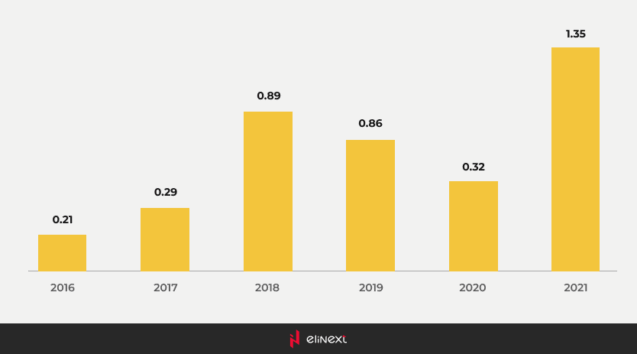Although much smaller than China’s and India’s, the Vietnamese market for offshore IT services has strengths these traditional outsourcing locations do not. Let’s delve into comparison to see what we are talking about.
Lately, China, India, and Vietnam are quite the topic of conversation in the IT industry circles. Securing the top spots in 2023 Kerney’s Global Service Location Index, the three have value and special importance in offshore outsourcing.
Yet, many differences remain in the markets, from business regulations to transparency to cultural affinity and more. Check out how Vietnam stacks up favorably against its primary Asian rivals.
Average ITO Worker’s Salary (2024, in USD)
According to data from Indeed, in China, an entry-level software engineer earns $70,601 a year versus $5,167 in India.
At the manager level, wage disparity decreases. Technical manager in China pulls in a salary of $94,800 annually whereas an Indian tech manager makes $13,273 per year.
Vietnam’s labor costs are cheaper. Junior developers are paid $4,140 yearly while managers with technical orientation receive an annual salary of $9,423.
Another factor to consider when comparing the three destinations is salary inflation and employee turnover.
China and India are more mature outsourcing locations than Vietnam. There are abundance of tech companies there and fierce competition for skilled talent. As a result, recent years have seen an increase in salaries and high turnover.
Vietnam also boasts a wealth of digital businesses with such prominent software engineering players as Elinext, Orient Software, FPT Software, TMA Solutions, and CMC Global driving the country’s advancements in the global digital scene.
Yet, Vietnam’s technology industry is still in its growth phase, and there is a huge talent pool that is keeping wages stable and attrition low.

Ease of Doing Business
Though China’s latest policy measures and developments aim to lure foreign investment in its technology sector through easing restrictions and fostering collaboration, negotiating with Chinese software engineering providers remains quite a unique challenge you must prepare for. To succeed, be ready to communicate with Chinese business operators on their terms.
Regarding India, despite marked progress, however, companies outsourcing IT projects to the country continue to face frequently shifting regulations, retrospective tax liabilities and restrictive labor laws.
In the last thirty years, the Vietnamese government has introduced a range of policies, master plans, and directives with the goal of enhancing the ICT industry and nurturing a thriving startup environment, including Decision No. 149/QD-TTg, Directive 16/CT-TTg, and Decree 10/2024/ND-CP.
Additionally, the government has rolled out several initiatives to liberalize its legal and regulatory framework, fostering increased foreign investment in the ICT sector. These efforts involve providing tax incentives and simplifying bureaucratic processes for tech companies.
It’s no surprise, then, that numerous influential global tech corporations, such as Apple, Panasonic, Samsung, LG, and Foxconn, to name a few, have selected Vietnam as a manufacturing base.
Intellectual Property
Enforcement of IPR laws remains a serious issue in China and also is problematic in India. Currently, these nations are the main international sources of piracy and counterfeit goods.
Vietnamese Law on Intellectual Property (July 2006), was revised twice in 2009 and in 2019 to conform to WTO standards on intellectual property protection. Today, the Law contains uniform, synchronous and transparent provisions to regulate IP issues.
Vietnam is also a signatory to these international treaties and conventions for intellectual property rights protection (including, but not limited to):
- Madrid Protocol,
- the Madrid Agreement,
- The Paris Convention, and
- The Stockholm Convention of 1967, which established the World Intellectual Property Organization.
Cultural Affinity
Ineffective communication can be one of the biggest barriers for U.S. and European customers looking to outsource to China.
Foreign companies have to adjust their communication style to align with Chinese cultural norms, such as using indirect language and avoiding blatant emotional displays.
The former British colony, however, retains better cultural affinity with Western countries.
Still, when considering Vietnam, one can observe a broad pool of professionals, a significant portion of whom have international work experience and are also well-acquainted with Western business practices and culture.
Furthermore, what sets Vietnamese workers apart from their Indian counterparts is their strong loyalty to employers.
Unlike employees in India, Vietnamese are focused on family bonds, and typically stay local, prioritizing family support over career opportunities abroad.
This mindset turns employees into more than mere contractors; they become teams who care about their projects.
Transparency
Chinese tech companies have often been criticized for a lack of transparency in business relations, making outsourcing more difficult.
Leading outsourcers in India generally emphasize transparency in their dealings with clients. The bad news is that not all Indian companies are like these. It might take time to find a reliable honest tech partner.
With a commitment to accountability, honesty and integrity, Vietnamese have garnered a reputation for being among the most transparent business partners worldwide.
NOTE! For many Western negotiators, the pace of negotiating with their Vietnamese partners appears slow.
Be patient, as there is a good reason behind this – Vietnamese leaders value relationship-building over quick deals and seek to establish long-standing partnerships based on trust, mutual respect, and shared goals.
English Proficiency
In Hong Kong companies will have no trouble finding English speakers, since English is the official language there. At the same time, with the second-largest population in the world — nearly 1.4 billion people — there are plenty of job prospects where Mandarin is sufficient. Thus, English in China is perceived as being of little use.
Furthermore, the teaching of the English language in China is facing opposition as it contradicts Chinese cultural values.
The former British colony and Vietnam have almost similar levels of English proficiency. Yet, India ranks 2 positions lower than Vietnam in the 2023 EF English Proficiency Index. Vietnam holds the 58th position out of 113 countries, while India is placed 60th.
What’s also important to note is that the Vietnamese education system is making efforts to elevate English to the status of a second language at universities instead of a foreign language. This sends a clear message that English proficiency is important for the nation.
Moreover, based on a survey conducted in June 2021, English stood out as the top choice among foreign languages, with 86% of the participants actively studying it.
Another Thing
To make the picture of the Vietnamese IT outsourcing market more complete, we should mention other factors that contribute to making the nation an attractive destination for many IT service buyers. These are:
A Broad Pool of Skilled Technologists: With 400+ institutions offering innovative programs in computer science and software engineering, Vietnam is a top producer of IT graduates worldwide (over 57,000 annually).
Vietnamese developers excel not just in number and affordability but also in tech prowess, scoring a spot in the Pentagon’s Top 10 countries with the best developers in the world. The nation’s recent win at the ACM ICPC programming competition further emphasizes the technical prowess of Vietnamese tech talent.
Strong Investment in Technical Talent: An abundance of talented IT graduates from such world-renowned Vietnamese universities like
– Duy Tan University,
– Ton Duc Thang University,
– Vietnam National University in Ho Chi Minh City,
– Vietnam National University in Hanoi, and
– Hanoi University of Science & Technology is not a mere coincidence, but a direct outcome of the government’s strong focus on STEM education.
Political Stability: Vietnam’s stable political environment is a key advantage in attracting foreign direct investment and enhancing investor confidence. Over the past decade, the country has consistently secured a place in the top half of nearly 200 nations on the Political Stability Index, according to the World Bank.
Mature Startup Ecosystem: For more than ten years, Vietnam has cultivated a vibrant startup ecosystem by fostering favorable policies and initiatives, leading to a considerable number of flourishing tech companies. Homegrown startups such as MoMo, VNG, Buy2sell, Tiki, Topica, Sky Mavis, Axie Infinity, and Vinmec are just a few success stories we witness in the emerging Vietnamese market.

Time Zone Advantage: Vietnam’s strategic time zone advantage ensures real-time communication with both European and Asian countries, as well as Australia and New Zealand. The country’s time zone also allows North American businesses to adopt a follow-the-sun strategy to speed up development work.
The Verdict
From the comparison of China, India, and Vietnam as key players in the offshore IT services market, it is evident that Vietnam possesses unique strengths that set it apart from its Asian counterparts.
Vietnam stands out for its competitive advantage in aspects such as lower labor costs, good cultural affinity with Western countries, loyalty of its highly skilled workforce, ease of doing business with supportive government policies, robust IP laws, vibrant startup ecosystem, and high level of English proficiency.
These factors, complemented by the country’s political stability and an emphasis on relationship building and trust, collectively contribute to making Vietnam a more favorable option for businesses outsourcing IT work than China and India.
Partner with Elinext — Leading Software Outsourcing Company Based in Ho Chi Minh City, Vietnam
Elinext is a full-cycle software outsourcing company with delivery centers in Vietnam, Poland, Georgia, Kazakhstan, and Uzbekistan and representative offices in the USA, France, Germany, Ireland, Singapore, and Hong Kong.
The extensive knowledge and expertise Elinext has within its walls enable us to help businesses elevate their value by creating groundbreaking custom software solutions.
Having been partners of progressive-minded tech leaders around the world for almost thirty years, we’ve gained insight into what exactly we should provide to the client at each phase of the development to make them satisfied.
If you want to jump-start a new project or take your existing application to the next level, our dedicated team is here to assist you with these issues and more. Drop us a line, and we’ll get in touch.









